2014年秋讷河市第二中学高一英语同步训练module 5 period4 vocabulary;writing;everyday english(module5
2014年秋人教新课标英语必修一unit5同步测试4 Word版含答案
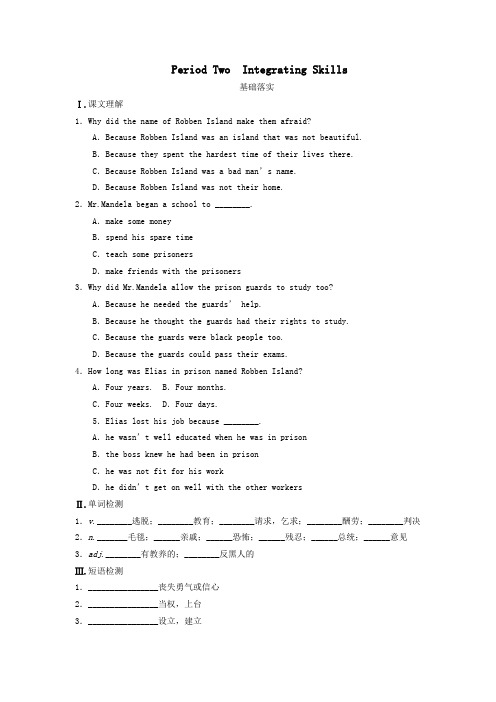
Period Two Integrating Skills基础落实Ⅰ.课文理解1.Why did the name of Robben Island make them afraid?A.Because Robben Island was an island that was not beautiful.B.Because they spent the hardest time of their lives there.C.Because Robben Island was a bad man’s name.D.Because Robben Island was not their home.2.Mr.Mandela began a school to ________.A.make some moneyB.spend his spare timeC.teach some prisonersD.make friends with the prisoners3.Why did Mr.Mandela allow the prison guards to study too?A.Beca use he needed the guards’ help.B.Because he thought the guards had their rights to study.C.Because the guards were black people too.D.Because the guards could pass their exams.4.How long was Elias in prison named Robben Island?A.Four years. B.Four months.C.Four weeks. D.Four days.5.Elias lost his job because ________.A.he wasn’t well educated when he was in prisonB.the boss knew he had been in prisonC.he was not fit for his workD.he didn’t get on well with the other workersⅡ.单词检测1.v.________逃脱;________教育;________请求,乞求;________酬劳;________判决2.n._______毛毯;______亲戚;______恐怖;______残忍;______总统;______意见3.adj.________有教养的;________反黑人的Ⅲ.短语检测1.________________丧失勇气或信心2.________________当权,上台3.________________设立,建立4.________________被判处……(徒刑)5.________________________阻止某人做某事Ⅳ.选词填空beg,sentence,reward,willing,educate,relative,escape,cruelty1.The best way to teach your children to read is to ________ him with lots of praise. 2.They will start their project to help the poor children to be ________ in the west of China.3.The old man has five children,but he becomes a ________,begging from door to door.4.He managed to ________ from the big fire into the street.5.The man was __________ to death for murder.6.It is always better to share your worries and troubles with your friends or __________.7.I don’t know whether he is ________ to come.8.I can’t stand some people’s ________ to animals.Ⅴ.完成句子1.Mr.Black had failed many times in this experiment,but he _______________(没有丧失信心).2.It is reported that __________________________________________________________ (新总统将于下个月上台).3.________________________(依我的观点),it’s wrong to cheat in examinations. 4.The judge ________________________________________________________________ (判处她三个月监禁) for shoplifting.5.I ________________________________(本应该更努力地学习) when I was young. 6.____________________________(我第一次去杭州时),I was struck by its beautiful scenery.Ⅵ.单项填空1.Luckily,he escaped ________ in the accident yesterday on this road.A.to kill B.killingC.to be killed D.being killed2.Please don’t ________.I’m sure that you’ll do better next time.A.lose your heart B.lose heartsC.lose heart D.lose your hearts3.He is so kind that he is always ready to help those ________.A.get into trouble B.in troubleC.have trouble D.make trouble4.At the dinner party we talked of the time ________ we stayed together in the country.A.which B.when C.where D.during5.Mr.White ________ at 8∶30 for the meeting,but he didn’t show up.A.should have arrived B.should arriveC.should have had arrived D.should be arriving6.For all these years,I have been working for others.I’m hoping I’ll _________ my own business someday.A.turn up B.fix upC.set up D.make up7.She started singing to the baby and was ________ with a smile.A.given B.offeredC.rewarded D.awarded8.The young man,who ________ to ten years in prison for his acts of violence,lost all hope for his future.A.sentenced B.had sentencedC.was sentenced D.was being sentenced9.If you have a job,________yourself to it and finally you’ll succeed.A.do devote B.don’t devoteC.devoting D.not devoting10.—How did you find your visit to the museum,Jack?—________.A.By taking a No.7 bus B.Oh,wonderful,indeedC.A friend showed me the way there D.I went there aloneⅦ.微写作写作素材1.作为律师,我热爱我的工作。
北师大版高中英语选择性必修2 教学设计UNIT 5 Period 4
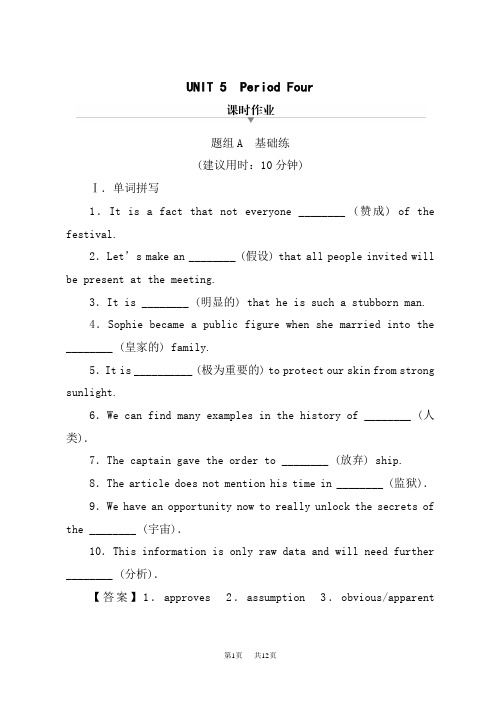
UNIT 5 Period Four题组A 基础练(建议用时:10分钟)Ⅰ.单词拼写1.It is a fact that not everyone ________ (赞成) of the festival.2.Let’s make an ________ (假设) that all people invited will be present at the meeting.3.It is ________ (明显的) that he is such a stubborn man.4.Sophie became a public figure when she married into the ________ (皇家的) family.5.It is __________ (极为重要的) to protect our skin from strong sunlight.6.We can find many examples in the history of ________ (人类).7.The captain gave the order to ________ (放弃) ship.8.The article does not mention his time in ________ (监狱).9.We have an opportunity now to really unlock the secrets of the ________ (宇宙).10.This information is only raw data and will need further ________ (分析).【答案】1.approves2.assumption3.obvious/apparent4.royal 5.vital 6.mankind 7.abandon 8.prison 9.universe 10.analysisⅡ.单句语法填空1.Taking regular exercise is ________ (benefit) to keeping our shape.2. ________ (obvious),Jack is outgoing and has confidence in himself.3.I need to get the ________ (approve) from my parents before we make the final decision.4. ________ (owe) to circumstances beyond our control,the flight to Rome has been cancelled.5.This discovery challenges ________ (convention) beliefs.6.At that time,I had an urge ________ (fly) to Paris to see my biological parents.7.________ (assume) that you are admitted into Peking University,what would you say to your teachers?8.The tourist attraction is certainly worthy of __________________ (visit).9.She devoted herself to teaching for forty-five years,and all her students ________ (respect) her a lot.10.There is only one thing that people can’t take away from you,and that is your ________ (wise)!【答案】1.beneficial 2.Obviously 3.approval 4.Owing 5.conventional6.to fly7.Assuming8.being visited9.respected 10.wisdomⅢ.完成句子1.She had to walk home with ______________________________ .自行车被偷了,她只好步行回家。
新教材英语外研版必修第二册学案unit5OntheroadPeriod4

Period 4 Developing ideas学案设计■■■■学习目标1.To understand and use the relevant words,phrases,and sentence structures in real situat ion.2.To sort out the relevant details,figure out the structure and the time order of the event,and understand the characteristics of the narratives.3.To apply the reading abi1ity to analyze other passages.and understand the authors purpose in writing the passage.4.To figure out the authors opinions about writing the passage and form correct views on respecting different cultures and appreciate cultural diversity.■■■■自主学习Words and expressions:Write down the meaning of each word and expression.1.vehicle fantastic2.typical make i t3.cant wait to do pick up4.cheer sb. up get lost5.Whats more keep in touch■■■■i果堂导入Enjoy a video:Introduction to CanadaBefore reading:Read and answer the questions of Activity 1 to see how much you know about Canada.■■■■i果堂探究While reading:Task l:Scan the emai1 and write the places on the map.【文章大意】Task 2:Read the passage quickly and answer the question.Whats the main idea of the passage?The passage mainly tells us _.【段落大意】一Task 3:Match the main idea of each paragraph.Para.1 We went on a boat trip after arriving at the destination.Para.2 Evas family managed to cross the North America.Para. 3 Beautiful scenery on the journey.Para. 4 What happened after our arrival at Quebec.【细节理解】Task 4:Read the passage carefully and answer the following questions.1. How did the author feel about their travel in Canada?A. Excited.B. Upset.C. Disappointed.D. Regretful.4. What did the authors family do to celebrate their arrival at the destination?A. They went on a boat trip.B.They took photos together.C. They went to a restaurant for supper.D.They visited a local zoo together.Task 5:Analyze the passage and find out what the underlined words refer to.1. We made il! (Paragraph I)J_t took us where we wanted,... (Paragraph 2)2. The funniest thing happened on I ha l day. (Paragraph 3)How did IhaI happen?(Paragraph 3) Task 6:Analyze key sentences.1. We started from Vancouver,where we picked up our vehicle for the trip-a home on wheels. 我们从温哥华出发,在那里取到了这次旅行的交通工具辆房车。
北师大版高中英语选择性必修2 UNIT 5 Period 4

英语 选择性 必修第二册 配北师大版
UNIT 5 EDUCATION
( )5.What’s the main idea of the sentence “All truths are
easy to understand once they are discovered; the point is to discover them”?
UNIT 5 EDUCATION
( )3.Why didn’t people in the 17th century believe
Galileo Galilei?
A.Because they believed more in religion.
B.Because the Earth was standing still.
_敦__促__某__人__做__某__事______
4.be beneficial to…
_对__…__…__有__益__________
5.show respect for
_尊__敬________________
6.to start with
_首__先________________
课前自主预习
课时作业
英语 选择性 必修第二册 配北师大版
UNIT 5 EDUCATION
¤重点词块
1.be worthy to be done _值__得__被__…__…__________
2.approve of sb. doing sth. _赞__成__某__人__做__某__事______
3.urge sb. to do sth.
课前自主预习
课堂新知讲练
语言时空
随堂知能小练
课时作业
2015-2016学年高一英语学案unit5period4《writing》(人教版必修3)
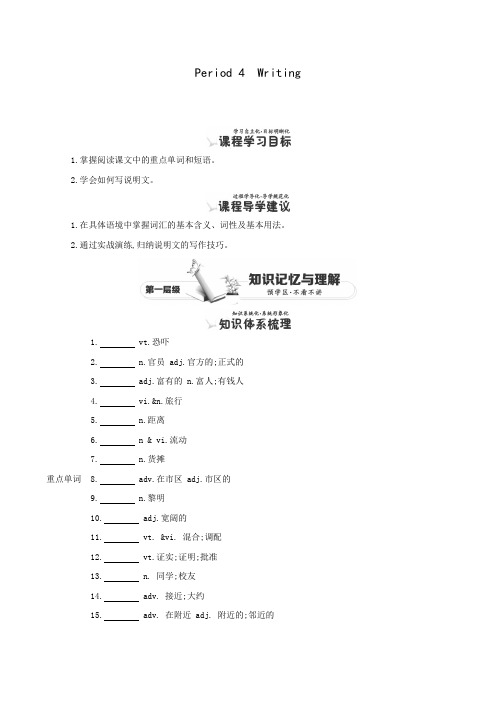
Period 4 Writing1.掌握阅读课文中的重点单词和短语。
2.学会如何写说明文。
1.在具体语境中掌握词汇的基本含义、词性及基本用法。
2.通过实战演练,归纳说明文的写作技巧。
选词填空2.It s dangerous placing the medicine the children.3. take the aeroplane,they decided to drive to Toronto.4.She didn t speak a word to me back home.5.You will never know what she to educate her children.【答案】1.settled down 2.within the reach of 3.Rather than 4.all the way 5.hasgone through1.confirm阅读下列句子,注意confirm的意思及用法。
The queen confirmed the treaty. 女王批准了条约。
We have confirmed the report. 我们证实了那则报道。
通过观察以上句子,我们发现confirm是(1) 词,意思是“(2)”。
【答案】(1)动(2)证实;证明;批准confirm sb in sb s belief / opinion / view 使某人更加确定某人的信念 / 意见 / 观点confirm sb as / in sth 批准某人任某职单项填空The expression on his face me in my suspicions.A.insistedB.indicatedC.suggestedD.confirmed【答案与解析】D 句意:他脸上的表情更加证实了我的怀疑。
confirm意为“证实;证明”,符合语境。
2.impress阅读下列句子,注意impress的意思及用法。
河北省衡水二中高一英语下学期第二次调研考试试题无答案新人教版1
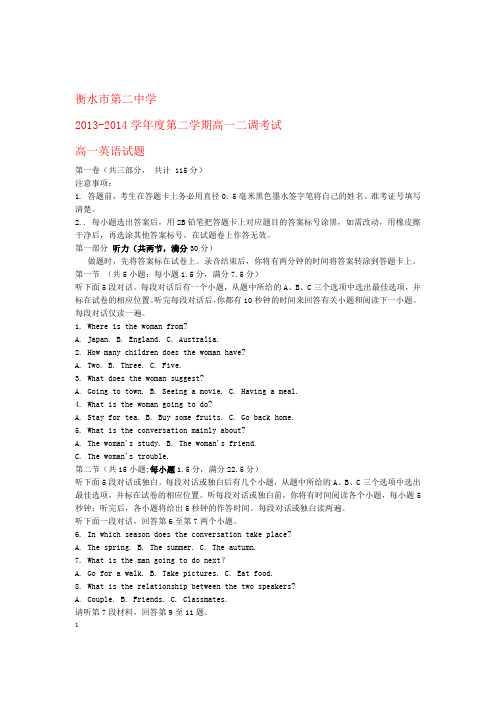
衡水市第二中学2013-2014学年度第二学期高一二调考试高一英语试题第一卷(共三部分,共计 115分)注意事项:1. 答题前,考生在答题卡上务必用直径0. 5毫米黑色墨水签字笔将自己的姓名、准考证号填写清楚。
2.. 每小题选出答案后,用2B铅笔把答题卡上对应题目的答案标号涂黑,如需改动,用橡皮擦干净后,再选涂其他答案标号,在试题卷上作答无效。
第一部分听力(共两节,满分30分)做题时,先将答案标在试卷上。
录音结束后,你将有两分钟的时间将答案转涂到答题卡上。
第一节(共5小题;每小题1.5分,满分7.5分)听下面5段对话。
每段对话后有一个小题,从题中所给的A、B、C三个选项中选出最佳选项,并标在试卷的相应位置。
听完每段对话后,你都有10秒钟的时间来回答有关小题和阅读下一小题。
每段对话仅读一遍。
1. Where is the woman from?A. Japan.B. England.C. Australia.2. How many children does the woman have?A. Two.B. Three.C. Five.3. What does the woman suggest?A. Going to town.B. Seeing a movie.C. Having a meal.4. What is the woman going to do?A. Stay for tea.B. Buy some fruits.C. Go back home.5. What is the conversation mainly about?A. The woman's study.B. The woman's friend.C. The woman's trouble.第二节(共15小题;每小题1.5分,满分22.5分)听下面5段对话或独白。
每段对话或独白后有几个小题,从题中所给的A、B、C三个选项中选出最佳选项,并标在试卷的相应位置。
Unit5Period 4 Reading for Writing高一英语(人教版新教材必修第一册)

2
Here is a mistake in grammar: the
prepostion phrase is used than the girl, so it
should follow the dog.
3
Reading for Writing
4
Jia Xin
Listening to English radio programmes helps me get used to how fast native speakers talk. I also repeat what I hear to help myself to experience the feeling of the language. Sometimes I even record my voice so I can listen to myself and compare my pronunciation with the radio host's.
Reading for Writing
Step 1: Introduction Offer some background information
Reading for Writing
What is your problems in
learning English?
Advice on how to solve your
problems
Reading for Writing
What is the problem in each situation. Keep in mind the right way to use English in regard to vocabulary, grammar and pragmatically.
安徽省淮南市第二中学2014-2015学年高一下学期期中考试英语试题 Word版无答案
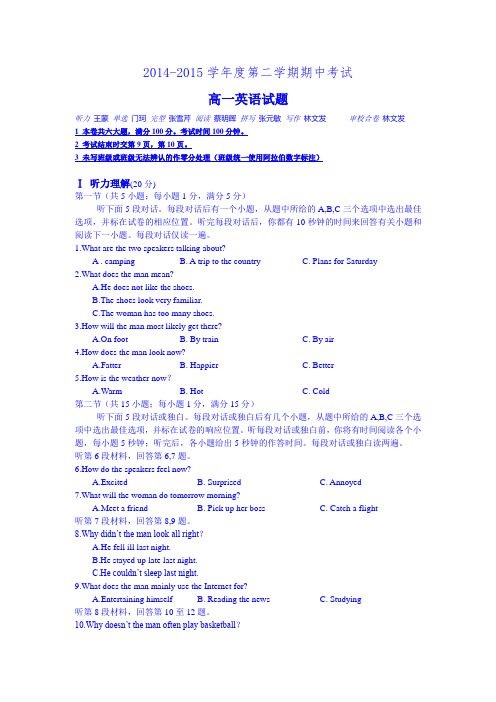
2014-2015学年度第二学期期中考试高一英语试题听力王蒙单选门珂完型张雪芹阅读蔡明晖拼写张元敏写作林文发审校合卷林文发1 本卷共六大题,满分100分。
考试时间100分钟。
2 考试结束时交第9页,第10页。
3 未写班级或班级无法辨认的作零分处理(班级统一使用阿拉伯数字标注)Ⅰ听力理解(20分)第一节(共5小题;每小题1分,满分5分)听下面5段对话。
每段对话后有一个小题,从题中所给的A,B,C三个选项中选出最佳选项,并标在试卷的相应位置。
听完每段对话后,你都有10秒钟的时间来回答有关小题和阅读下一小题。
每段对话仅读一遍。
1.What are the two speakers talking about?A . camping B. A trip to the country C. Plans for Saturday2.What does the man mean?A.He does not like the shoes.B.The shoes look very familiar.C.The woman has too many shoes.3.How will the man most likely get there?A.On footB. By trainC. By air4.How does the man look now?A.FatterB. HappierC. Better5.How is the weather now?A.WarmB. HotC. Cold第二节(共15小题;每小题1分,满分15分)听下面5段对话或独白。
每段对话或独白后有几个小题,从题中所给的A,B,C三个选项中选出最佳选项,并标在试卷的响应位置。
听每段对话或独白前,你将有时间阅读各个小题,每小题5秒钟;听完后,各小题给出5秒钟的作答时间。
每段对话或独白读两遍。
听第6段材料,回答第6,7题。
6.How do the speakers feel now?A.ExcitedB. SurprisedC. Annoyed7.What will the woman do tomorrow morning?A.Meet a friendB. Pick up her bossC. Catch a flight听第7段材料,回答第8,9题。
高中英语Unit5EducationPeriod4Lesson3课件北师大版选择性必修第二册

( )4.What’s the aim of the writer when Aristotle and Galilei are referred to in the third paragraph?
A.Aristotle was wrong. B.It’s unbelievable for great men to be wrong. C.Galilei was wrong. D.Everyone can be wrong at times. 【答案】D
课文语篇研读
一、阅读理解 ( )1.What is the first step to acquire knowledge and understanding? A.To find answers. B.To study the facts. C.To test answers. D.To put forward questions. 【答案】D
( )2.Aristotle proved the idea that the Earth is not the
centre of the universe.
【答案】1.T 2.F
( )3.People were strongly against Galilei’s studies at first and then urged him to give up.
( )5.What’s the main idea of the sentence “All truths are
easy to understand once they are discovered; the point is to discover them”?
A.All truths are easy to discover. B.It’s most important to discover truths. C.It’s more important to understand truths than to discover
2014年秋讷河市第二中学高一英语同步训练module 3 period2(module3 body language and non-verbal communi
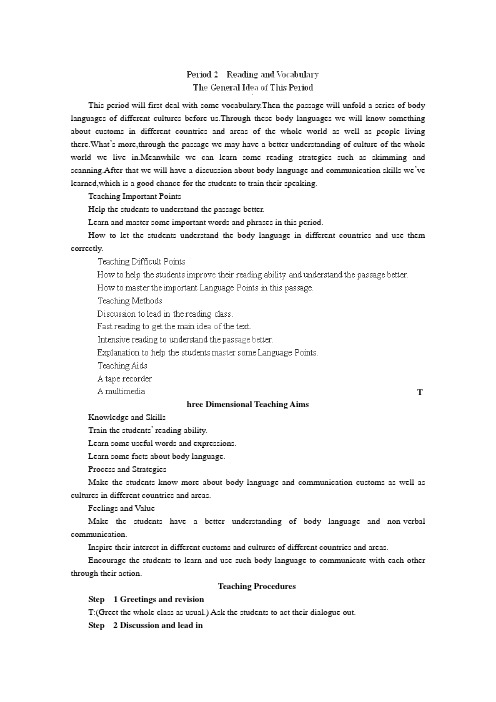
This period will first deal with some vocabulary.Then the passage will unfold a series of body languages of different cultures before us.Through these body languages we will know something about customs in different countries and areas of the whole world as well as people living there.What’s more,through the passage we may have a better understanding of culture of the whole world we live in.Meanwhile we can learn some reading strategies such as skimming and scanning.After that we will have a discussion about body language and communication skills we’ve learned,which is a good chance for the students to train their speaking.Teaching Important PointsHelp the students to understand the passage better.Learn and master some important words and phrases in this period.How to let the students understand the body language in different countries and use them correctly.Three Dimensional Teaching AimsKnowledge and SkillsTrain the students’ reading ability.Learn some useful words and expressions.Learn some facts about body language.Process and StrategiesMake the students know more about body language and communication customs as well as cultures in different countries and areas.Feelings and ValueMake the students have a better understanding of body language and non-verbal communication.Inspire their interest in different customs and cultures of different countries and areas.Encourage the students to learn and use such body language to communicate with each other through their action.Teaching ProceduresStep 1 Greetings and revisionT:(Greet the whole class as usual.) Ask the students to act their dialogue out.Step 2 Discussion and lead inT:In the last class we have known something about body language through listening and speaking activity.We have known that we could communicate not just by words but also by our expressions and body languages or movements,sometimes we may even communicate better and more clearly using body language than words.For example,nodding the head means agreement in our country,while in some Asian countries it means disagreement.If you want to learn more about body language,please read the passage on P22 carefully.Before reading,we’ll learn the new words and phrases in this period.(Show the following words and phrases on the screen.)communication position unconscious aggressive gesture involve bow slap spread bend hug stare formal informal communicate with make a deal mind reader hold up vary from...to...be busy with give away on guard(Let the students read the words and phrases after the teacher.The teacher can give a brief introduction to the students if necessary or they may discuss with their partners.)T:Now look at the three questions on the screen and discuss them in groups of four.(The teacher shows the questions on the screen.)1.Can you guess what someone is thinking or feeling by looking at their body language?2.Do people from different parts of the world use different body language?What about people who live in different parts of China?3.How do you communicate the following with body language?Thank you!No.Yes.I don’t e here.(The teacher gives the students three minutes to discuss and then asks some students to answer them.)T:(Three minutes later.) Have you finished your discussion?Ss:Yes.T:OK!Who’d like to answer the first question?S:Let me try.I can guess what someone is thinking or feeling by looking at their body language.For example,when I see someone raising his hand,I can see they are having questions to ask or need to ask for help.T:Very good.Let’s go on.Question 2,any volunteer?S:It’s my turn.I think people from different parts of the world as well as China use different body language.Take greeting people for example.People in Russia,France and Arab countries kiss each other when they meet,however,people in China or Australia shake hands instead of kissing.S:I do not think so.From where I stand,people from different parts of the world and from different parts of China use the same body language.Here I give a simple example:people in China wave their hands to say goodbye to other people they know,so do people in foreign countries.(As for the last question,the teacher can require the students to act them out before the whole class.)Step 3 Fast readingT:OK!You’ve known something about body language.Now we are going to read a passage,from which we will learn more about body language.Open your books and turn to P22.Read the passage quickly and summarize the main idea of each paragraph.(After a few minutes,the teacher checks the main ideas they summarize.)T:Who’d like to tell the main idea of Para.1?Any volunteer?S:I think that this paragraph mainly tells us that we communicate with people not only by spoken or written words by also by body language.T:True or false?Ss:True.T:You are right.Para.2?This time,who wants to take this chance?S:In this paragraph we learned that “learned” body language varies from culture to culture.T:You did a good job.What about Para.3?S:In my opinion,the main idea of this paragraph may be that the same body parts have shows different body languages in some different countries.T:Right,you understand it. Paragraph 4,anyone?S:I guess that people use their hands as a gesture of trust.T:Good answer.Sit down,please.The last paragraph,who’d like to have a try?S:Maybe we should learn body language and be a mind reader.Step 4 Intensive readingT:Quite true.We have known the main idea of each paragraph.Now read the passage again and underline the useful words,phrases and expressions as well as say if these statements are T or F on the screen.This time you should read slowly and carefully.(Show the following questions on the screen.)1.Not all body language is conscious.2.Europeans shake hands with their left hand.3.In Asia,people touch strangers when they meet.4.In the US a “high five” is a way of saying hello.5.A “high five” is a formal gesture.6.Body language is less communicative than spoken or written language.(The teacher gives the students another four minutes to read the passage and then asks some students to judge whether these statements T or F and do this exercise together.)T:Have you finished your reading?Ss:Yeah.T:Good.Now let’s check the answer together.The first one?T or F?Ss:T.T:Excellent.What about No.2?Ss:F.T:Why do you think it’s F?Who can give me a reason?S:In Paragraph 2 we could easily see that Europeans and Americans shake hands with the right hand—the strongest hand for most people.T:You are absolutely right.No.3,T or F?Ss:F.T:Good.Why is it wrong?S:We could find such detail at the beginning of paragraph 3:Greetings in Asian countries do not involve touching the other person.T:Well done.Statement 4?T or F?Ss:T.T:Excellent!How about the fifth one?Ss:F.T:Anybody can explain the reason?S:The first sentence of Paragraph 4 tells us why.If we really understand this paragraph,we could easily know this statement is wrong.T:Good reason,ha?The last one?Ss:T.Suggested answers:1.T2.F3.F4.T5.F6.FStep 5 Language studyT:You are familiar with the passage now.But you should also pay enough attention to some useful words and expressions.Let’s check whether we have mastered these words and expressions through the following two exercises. Ex.1 Complete the sentences with the words given.(The teacher shows the words and exercise on the screen.)Aggressive deal gesture greet formalinformal position trust unconscious Weapon1.Guns and knives are two different types of__________.T:Read these words one by one together and pay attention to the words where the stress doesn’t fall on the first syllable:aggressive,position,unconscious.T:Complete this exercise individually,and then check them with a partner.(The teacher gives the students two or three minutes to finish this exercise,and then can go around the class to help those having difficulty in dealing with it.)(Two or three minutes later,the teacher checks the answers.)T:Have you finished it?Ss:Yeah.T:Now let’s check the answers together one by one.Suggested answers:1.weapons2.aggressive3.greet4.position5.unconscious6.deal7.gesture8.trustrmal10.formalT:Just now you all did well.Now you are going to do Ex.2 (The teacher shows the following sentences on the screen and asks students to translate them one by one.At the same time,the teacher explains the underlined phrases.)Ex.2 Translate the following sentences into Chinese.1.The weather varies from place to place.2.They were involved in the matter.3.The children stared at the coloured ballons.4.We made a deal and agreed to help him out.5.The girls are busy greeting the foreigners over there (The teacher writes the phrases on the blackboard:vary from...to...;be involved in;stare at;make a deal;be busy doing sth.) Step 6 Listening and consolidationT:Now look at your books.I’ll play the tape.Listen carefully.You can follow it in a low voice.Pay attention to the pronunciation and intonation.(After finishing the playing of the tape)T:From the text,we know people can use body language to communicate,but some body language is different in different countries or areas,that is,when wanting to express the same meaning,people in different countries use different body language.Look at the chart on the screen.Work in pairs or in groups.First have a discussion,and then complete the chart.In the end,I’ll check the answers.Countries or areas The way of greeting The parts of bodyinvolved The meaning of the greeting(A few minutes later,the teacher checks the answers by showing them on the screen and having the students check them by themselves.)Suggested answers:Countries or areas The way of greeting The parts of body involved Europe and America Shake hands The right handChina Put the right hand on the left and bowslightlyBoth handsMuslims Give a “salaam”Heart,mouth and forehead Hindus Join their hands and bow their heads Hands and headsAmericanyouthsGive me five HandsStep 7 Summary and homeworkT:In this period we have learned some vocabulary and please try to keep them in mind after class.Through the reading of the text we know something about body language and non-verbal communication.We have learned that different people have different ways of making communication through body language.After class,please read this passage again and again till you can recite it or retell it in your own words;meanwhile,try your best to master the useful expressions in this period.What’s more,remember to preview Grammar 1;Listening and vocabulary.Though we are making much progress,we have a long way to go.So it is our task to study hard and make great efforts to spread our culture.So much for today.Good-bye,everyone!The Design of the Writing on the BlackboardModule 3Body Language and Non-verbal CommunicationThe second periodstare atmake a dealbe involved invary from...to...be busy doing sth.Record after Teaching_______________________________________________________________________ _______________________________________________________________________ _______________________________________________________________________Activities and Research1.Find out more information about body language.2.Encourage the students to use the body language they have just learned.Reference for TeachingLanguage Points1.yet/already相同点:都用来谈目前有关的动作或事件。
高中英语真题-Module5NewspapersandMagazinesPeriodTwo List
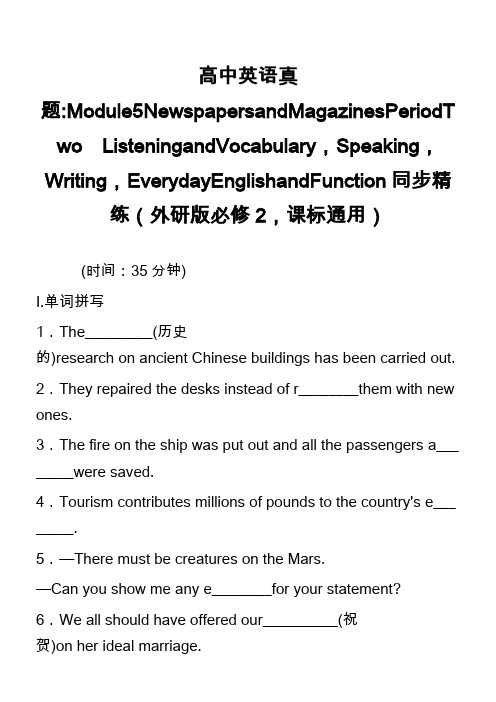
高中英语真题:Module5NewspapersandMagazinesPeriodT wo ListeningandVocabulary,Speaking,Writing,EverydayEnglishandFunction同步精练(外研版必修2,课标通用)(时间:35分钟)Ⅰ.单词拼写1.The_________(历史的)research on ancient Chinese buildings has been carried out. 2.They repaired the desks instead of r________them with new ones.3.The fire on the ship was put out and all the passengers a___ _____were saved.4.Tourism contributes millions of pounds to the country's e___ _____.5.—There must be creatures on the Mars.—Can you show me any e________for your statement?6.We all should have offered our__________(祝贺)on her ideal marriage.7.He worked very hard and at last gained great________(成就).8.________(文化的)influences in this area are quite wide. 9.The high official was put into prison for________(金融的)reasons.10.The film got excellent________(评论)the first time it was seen.答案 1.historical 2.replacing 3.aboard 4.economy5.evidence6.congratulations7.achievement8.Cultural9.financial 10.review(s)Ⅱ.翻译句子1.祝贺你喜获千金。
Unit 5 Music 第4课时 单元知识点复习 高一英语(人教版2019必修第二册)

Period 4 Words and Expressions
Music is the universal language of mankind.
-Henry Wadsworth
1.Learn to know the usage of some important words. 2.To do some exercises by using these words.
(energy).
2.perform vi.& vt. 表演;履行;执行 (1)perform one’s duty履职尽责 perform an operation/experiment做手术/实验 perform well/badly表现很好/很差 (2)performer n.表演者;演员 performance n.[C]表演;表现;[U]执行 put on a performance表演节目 give a performance 演出
the amount of medicines usedto _p_e_r_fo_r_m___(perform) medicalimaging (医学影像) procedures.
position成分; (音乐/艺术/诗歌的)作品; 作文
__c_o_m_p__o_se____ vt 组成; 创作 __c_o_m_p__o_se_r___ n 作曲者; 作曲家
tomorrow evening. 不是汤姆就是他的双胞胎妹妹明天晚上要有演出。
[衔接高考] ①(2021·新高考Ⅰ)But like allp_e_r_f_o_rm__a_n_c_e_s_ (perform), there are
moments when things go wrong. ②(2021·天津第一次)The project also resulted in a reduction in
- 1、下载文档前请自行甄别文档内容的完整性,平台不提供额外的编辑、内容补充、找答案等附加服务。
- 2、"仅部分预览"的文档,不可在线预览部分如存在完整性等问题,可反馈申请退款(可完整预览的文档不适用该条件!)。
- 3、如文档侵犯您的权益,请联系客服反馈,我们会尽快为您处理(人工客服工作时间:9:00-18:30)。
In this period we will train the students’writing ability.First,in Activity 1 we’ll learn the connection between the words in A and those in B,such as hill and hilly;mountain and mountainous;coast and coastal;desert and desert.Time permitting,teach the students more knowledge about word formation.Then complete the sentences with words from Activity 1.Then we’ll do another word practice in Activity 3,which is matching the words in the box with their meanings.In Activity 4,there is a passage,from which we’ll learn how to describe a region.After that,write a short description of the region you live in,including information in Activity 4.(If time is unlimited,it can be homework.) Everyday English today are from the text A Trip Along the There Gorges and Postcards to Myself in cultural corner.Get the students to know their meaning and use them correctly.Encourage the students to do this activity individually and then check with a partner.To consolidate it the teacher may ask the students to make up a sentence using the expressions in this part.Teaching Important PointsLearn word formation and how to describe a region.Teaching Difficult PointsLet the students know word formation and can describe a region and use the everyday English correctly.Teaching MethodsTeaching and StrategiesMake the students learn how to use some simple everyday English.Through the practice of description,make the students learn to use it.Feelings and ValueThrough the study of this period,improve their love for their hometown and our motherland.Teaching ProceduresStep 1 Revision(Greet the students as usual.)Point out the mistakes in their homework.Step 2 Vocabulary and writingT:Look at the words in Activity 1,and explain the connection between the words in column A and those in column B.(Show the following words on the screen.)A BHill hillyMountain mountainousCoast coastalDesert desertCall back suggestions from the whole class.Suggested answers:Column B shows the adjective forms of the nouns in Column A.It is easy for the students to tell their connection.Point out that these are four different ways in which a noun can be made into an adjective.Encourage the students to give other examples and some other way to make a noun into an adjective.T:Good job!Now,complete the sentences with words from Activity 1.(Show the following on the screen.)1.We live in a_________area in the northwest.It never rains.2.Many of the_________in the Himalayas are more than 5000 metres high.3.The area I live in isn’t flat.It’s____________.4.Shanghai is on the____________,at the mouth of the Yangtze River.Suggested answers:1.desert2.mountains3.hilly/mountainous4.coastT:When we use adjectives to modify nouns,remember that some adjectives go well with nouns,and some don’t.(Refer to learning to learn on Page 47.) For example:we can say:a tall mountain,a tall tree,a high mountain,high groundBut you can’t say:a high tree,tall groundWords which go well together are called collocations.T:So much for this.Let’s come to Activity 3.Match the words in the box with the meanings. (Show the following words and phrases on the screen.)Immense fertile remote steep1.going sharply up or down2.good for growing things3.very big4.far awayT:First,read through the words individually and pay attention to the two words where the stress doesn’t fall on the first syllable:immense,remote.Then match them with the meanings.Call back the answers from the whole class,having one student read the definition and another give the correct word.Suggested answers:1.steep2.fertile3.immense4.remoteRead the words and ask the students to follow you.T:So much for word practice.Next,we’ll read a passage,and identify which province the write describes.At the same time,underline the sentence which:1.says where the province is2.gives the writer’s opinion3.describes the main geographical features4.explains a meaningRead the following description:My home province is an immense region in the southwest of the country,with a very varied landscape.Much of it is hilly,but in the remote areas in the west it reaches the steep slopes of the Himalayas.There are mountains to the north and a high plateau to the south.In the east there arefertile plains and lots of towns.Nearly 100 million people live here,most of them in the east.I think it is a beautiful province.People call it “The Heavenly Kingdom” but the name really means “four rivers”.The most famous river is the Yangtze,which passes all the way through the province on its long journey to the coast.The most beautiful spot on the river is the Three Gorges.After they finish their questions individually,check them with a partner.Then ask some of them to report their answers.Suggested answers:The province is:Sichuan.1.My home province is an immense region in the southwest of the country.2.I think it’s a beautiful province.3.Much of it is hilly,but in the remote areas in the west it reaches the steep slopes of the Himalayas.4.People call it “the Heavenly Kingdom” but the name really means “four rivers”.T:All of you did a good job in this part.In the passage,you may notice there are some adjective + noun combinations,such as home province,immense region,steep slopes,etc.Make a list of them.Suggested answers:home province immense region varied landscape remote areas steep slopes high plateau fertile plains beautiful province Heavenly Kingdom famous river long journey beautiful spotT:The passage is a good example of description.Read it again,and try to imitate.Write a short description of the region you live in,including information in Activity 4.(The passage in the book provides a good example for the students to follow.)If time limited,ask the students to write a headline and the main points.The teacher can leave it as today’s homework.Step 3 Everyday EnglishT:When we talk with foreigners we may often be confused by what they say.For example,if we hear somebody say “You are pulling my leg.”,maybe we’ll be puzzled and misunderstand him.But actually he means “You are making fun of me.” Sometimes it is difficult for us to make sense of some English expressions.Here are more examples.Read them and choose the correct answer to each question.1.That sounded fine to me.(a) It seemed like a good idea.(b) It didn’t seem like a good idea.2. Oh well(a) Never mind! (b) I’m pleased.3.All tourists are ripped off.(a) welcomed (b) cheated4.They’ve been around for six thousand years.(a) traveled (b) existed5.I get a kick out of traveling.(a) enjoy (b) find it hardSuggested answers1.a 2.a 3.b 4.b 5.aT:Read them again,and try to use it in your everyday English.Step 5 Summary and homeworkT:This period first we learned some word formation and practiced how to describe a place by using adj.+ noun combination.In Everyday English we learned some useful expressions.Yourhomework today is to write a short description of the region you live in,including the information in Activity 4.This is the end of this class.You are dismissed.。
